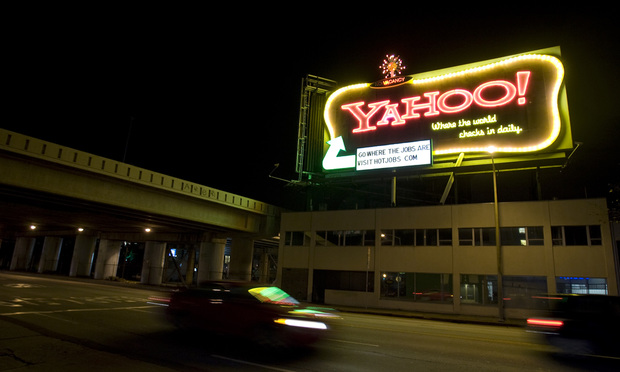SEC's $35M Cyber Disclosure Settlement With Yahoo Could Be 'Rubicon Moment'
This could be a sign that the commission will start cracking down harder on breach disclosure issues in the future.
April 26, 2018 at 05:35 PM
3 minute read
 (Photo: Jason Doiy/ALM)
(Photo: Jason Doiy/ALM) This week, the U.S. Securities and Exchange Commission and Altaba Inc., (formerly known as Yahoo! Inc), came to a $35 million settlement over the company's alleged failure to disclose a massive data breach that was discovered in 2014 but, according to the commission, was not reported to investors until 2016.
Attorneys who work on cybersecurity matters believe this action will be far from the last of its kind—and that the SEC will continue to pursue publicly traded companies that it believes are not keeping investors informed enough.
“This is a Rubicon moment,” said Denver Edwards, a principal at Bressler Amery Ross. He said the SEC has been talking “for a long time” about cracking down on publicly traded companies that fail to properly report data breaches to investors and regulators.
The breach allowed Russian hackers to gain access to usernames, birthdates, telephone numbers and encrypted emails and affected over 500 million of its users' accounts. It also impacted the company's former GC, Ron Bell, who resigned after the in-house legal team was blamed in part for not sufficiently pursuing an investigation of the attack.
Yahoo neither admitted nor denied the SEC's allegations.
Companies deciding when to speak up about a breach face competing regulations and business interests. Edwards said that, before reporting data breaches, companies must “not jump out in front without having the material in hand.” He said it is reasonable for a company to gather as much information as possible before reporting the breach, however they should also notify the SEC as soon as possible.
The amount of time companies can put off telling regulatory agencies about a data breach varies from state to state. Edward McAndrew, partner at Ballard Spahr, said that in some states, such as New York, companies have as little as 72 hours to report a breach after they have a reasonable suspicion of one occurring, but other states give companies as many as 45 to 60 days to report to state authorities.
Robert E. Cattanach, a partner at Dorsey & Whitney in Minneapolis specializing in cybersecurity, said three things should be done when a company reasonably suspects a breach might have occurred. He said the breach should be confirmed, there should be a blackout on trading in that company's stock, and the breach should be reported. “That sequence should be done within hours,” Cattanach said.
McAndrew said that attorneys should be more careful in how they speak about cybersecurity. What got Yahoo in trouble, he said, is that the company wrote in its quarterly and annual filings “[W]e may be at risk for future data breaches.”
“That language is going to be problematic where there is any type of significant data breach,” McAndrew said. “In-house lawyers are going to have to be much more careful that they are not misrepresenting, by omission, cyber incident history.”
Ultimately, he said, the legal department is going to have to be more involved in instances of data breaches than Yahoo's legal team appeared to be.
“One of the lessons for the general counsel is they have to be quarterbacking these investigations,” McAndrew said. “If they're not in the loop in the investigation, they're not going to be able to make decisions.”
This content has been archived. It is available through our partners, LexisNexis® and Bloomberg Law.
To view this content, please continue to their sites.
Not a Lexis Subscriber?
Subscribe Now
Not a Bloomberg Law Subscriber?
Subscribe Now
NOT FOR REPRINT
© 2025 ALM Global, LLC, All Rights Reserved. Request academic re-use from www.copyright.com. All other uses, submit a request to [email protected]. For more information visit Asset & Logo Licensing.
You Might Like
View All
FTC Sues PepsiCo for Alleged Price Break to Big-Box Retailer, Incurs Holyoak's Wrath
5 minute read
Wells Fargo and Bank of America Agree to Pay Combined $60 Million to Settle SEC Probe

‘Extremely Disturbing’: AI Firms Face Class Action by ‘Taskers’ Exposed to Traumatic Content
5 minute read
MLB's Texas Rangers Search for a New GC and a Broadcasting Deal
Trending Stories
- 1Democracy in Focus: New York State Court of Appeals Year in Review
- 2In Vape Case, A Debate Over Forum Shopping
- 3SDNY Criminal Division Deputy Chief Returns to Debevoise
- 4Brownstein Adds Former Interior Secretary, Offering 'Strategic Counsel' During New Trump Term
- 5Tragedy on I-95: Florida Lawsuit Against Horizon Freight System Could Set New Precedent in Crash Cases
Who Got The Work
J. Brugh Lower of Gibbons has entered an appearance for industrial equipment supplier Devco Corporation in a pending trademark infringement lawsuit. The suit, accusing the defendant of selling knock-off Graco products, was filed Dec. 18 in New Jersey District Court by Rivkin Radler on behalf of Graco Inc. and Graco Minnesota. The case, assigned to U.S. District Judge Zahid N. Quraishi, is 3:24-cv-11294, Graco Inc. et al v. Devco Corporation.
Who Got The Work
Rebecca Maller-Stein and Kent A. Yalowitz of Arnold & Porter Kaye Scholer have entered their appearances for Hanaco Venture Capital and its executives, Lior Prosor and David Frankel, in a pending securities lawsuit. The action, filed on Dec. 24 in New York Southern District Court by Zell, Aron & Co. on behalf of Goldeneye Advisors, accuses the defendants of negligently and fraudulently managing the plaintiff's $1 million investment. The case, assigned to U.S. District Judge Vernon S. Broderick, is 1:24-cv-09918, Goldeneye Advisors, LLC v. Hanaco Venture Capital, Ltd. et al.
Who Got The Work
Attorneys from A&O Shearman has stepped in as defense counsel for Toronto-Dominion Bank and other defendants in a pending securities class action. The suit, filed Dec. 11 in New York Southern District Court by Bleichmar Fonti & Auld, accuses the defendants of concealing the bank's 'pervasive' deficiencies in regards to its compliance with the Bank Secrecy Act and the quality of its anti-money laundering controls. The case, assigned to U.S. District Judge Arun Subramanian, is 1:24-cv-09445, Gonzalez v. The Toronto-Dominion Bank et al.
Who Got The Work
Crown Castle International, a Pennsylvania company providing shared communications infrastructure, has turned to Luke D. Wolf of Gordon Rees Scully Mansukhani to fend off a pending breach-of-contract lawsuit. The court action, filed Nov. 25 in Michigan Eastern District Court by Hooper Hathaway PC on behalf of The Town Residences LLC, accuses Crown Castle of failing to transfer approximately $30,000 in utility payments from T-Mobile in breach of a roof-top lease and assignment agreement. The case, assigned to U.S. District Judge Susan K. Declercq, is 2:24-cv-13131, The Town Residences LLC v. T-Mobile US, Inc. et al.
Who Got The Work
Wilfred P. Coronato and Daniel M. Schwartz of McCarter & English have stepped in as defense counsel to Electrolux Home Products Inc. in a pending product liability lawsuit. The court action, filed Nov. 26 in New York Eastern District Court by Poulos Lopiccolo PC and Nagel Rice LLP on behalf of David Stern, alleges that the defendant's refrigerators’ drawers and shelving repeatedly break and fall apart within months after purchase. The case, assigned to U.S. District Judge Joan M. Azrack, is 2:24-cv-08204, Stern v. Electrolux Home Products, Inc.
Featured Firms
Law Offices of Gary Martin Hays & Associates, P.C.
(470) 294-1674
Law Offices of Mark E. Salomone
(857) 444-6468
Smith & Hassler
(713) 739-1250






